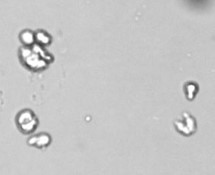CellXVivo Human Monocyte-derived DC Differentiation Kit
CellXVivo Human Monocyte-derived DC Differentiation Kit Summary
For the differentiation of CD14+ monocytes into dendritic cells.
Key Benefits
- Provides optimized reagents needed to induce immature and mature dendritic cell differentiation from CD14+ monocytes
- Utilizes validated and straightforward procedures
- Does not require specialized instrumentation
Why Generate Monocyte-derived Dendritic Cells Ex Vivo?
Dendritic cells are a heterogeneous population of functionally homologous immune cells that act as key mediators of the innate and adaptive immune responses. Under homeostatic conditions, dendritic cells are present in large numbers in areas of intense antigen exposure such as the skin, lung, and intestine and can be difficult to isolate and harvest. However, in response to an immune stimulus, CD14+ monocytes, which are present in high numbers in the periphery and circulation, can differentiate into inflammatory/monocyte-derived dendritic cells. Harvesting CD14+ monocytes from peripheral blood mononuclear cells and driving their differentiation into either immature or mature dendritic cells provides an abundant source of monocyte-derived dendritic cells for downstream studies.
This kit contains the following optimized reagents for the differentiation of monocyte-derived dendritic cells.
- Serum-Free Dendritic Cell Base Media
- Recombinant Human IL-4
- Recombinant Human GM-CSF
- Recombinant Human TNF-alpha
- Reconstitution Buffer 2
Stability and Storage
Store the unopened kit at < -20 °C. Do not use past the kit expiration date. Opened or reconstituted Serum-Free Dendritic Cell Base Media, Recombinant Human IL-4, Recombinant Human GM-CSF, or Recombinant Human TNF-alpha should be stored at 2-8 °C under sterile conditions for up to 30 days or at -20 °C to -70 °C in a manual defrost freezer for up to 3 months.* Opened Reconstitution Buffer 2 should be stored at 2-8 °C under sterile conditions for up to 3 months.*
*Provided this is within the expiration date of the kit.
Specifications
Product Datasheets
Scientific Data
 View Larger
View Larger
Morphology of Immature Human Dendritic Cells Cultured in Differentiation Media for 7 days. Human CD14+monocytes were differentiated into immature human dendritic cells by culturing for 7 days using reagents included in this kit. Immature dendritic cells exhibit characteristic dendritic cell morphology.
 View Larger
View Larger
Phenotypic Analysis of Cultured Immature and Mature Monocyte-derived Dendritic Cells. Following culture in complete monocyte-derived differentiation media provided in this kit, day 7 immature dendritic cells (top) and day 10 TNF-alpha treated mature dendritic cells (bottom) were stained with the indicated antibodies for DC-SIGN/CD209 (Catalog # MAB161), B7-1/CD80 (Catalog # MAB140), B7-2/CD86 (Catalog # MAB141), CD83 (Catalog # MAB1774; open histograms), or an appropriate isotype control antibody (filled histograms). Stained cells were analyzed using a Becton Dickinson FACSCalibur™.
 View Larger
View Larger
Mature Dendritic Cells Induce Proliferation of Allogeneic T-cells. Serial dilutions of day 10 TNF-alpha treated mature dendritic cells were incubated with allogeneic (blue) or autologous (red) human T cells for 3 days.3H-Thymidine (3H-TdR) was added to the culture for the final 18 hours. Cells were harvested and the incorporation of3H-TdR was measured using a scintillation counter. Results are presented as the mean cpm of triplicates.
Assay Procedure
Refer to the product datasheet for complete product details.
Briefly, mature human monocyte-derived dendritic cells can be generated using the following procedure:
- Isolate human CD14+ monocytes from a PBMC preparation
- Culture CD14+ monocytes in growth factor-supplemented Serum-Free Dendritic Cell Base Media
- Verify differentiation into immature dendritic cells by flow cytometry
- Induce dendritic cell maturation with TNF-alpha
- Verify dendritic cell maturation via flow cytometry
Reagents Supplied in the Human Monocyte-derived Dendritic Cell Differentiation Kit (Catalog # CDK004):
- Serum-Free Dendritic Cell Base Media
- Recombinant Human IL-4
- Recombinant Human GM-CSF
- Recombinant Human TNF-alpha
- Reconstitution Buffer 2
Reagents
- MagCellect™ Human CD14+ Cell Isolation Kit (R&D Systems, Catalog # MAGH105, or equivalent).
- Ficoll-Hypaque™
- Penicillin (optional)
- Streptomycin (optional)
Equipment
- Tissue culture flasks and/or plates
- Inverted microscope
- Hemocytometer
- 37 °C and 5% CO2 humidified cell culture incubator
- Benchtop centrifuge
- Pipettes and pipette tips
Isolate PBMCs from human blood.
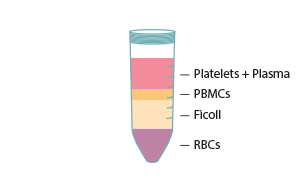
Enrich human CD14+ cells from PBMCs (e.g., using magnetic cell selection).
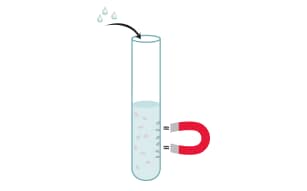
Perform a cell count.

Suspend 1 x 106 CD14+ cells/mL in Differentiation Media.
Culture the cells for 7 days.
Add fresh Diferentiation Media every 2-3 days.
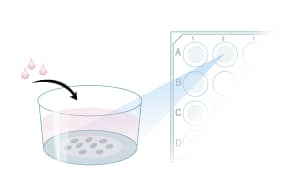
Verify immature dendritic cell differentiation by flow cytometry.
The Th2 cells are now ready for further downstream applications.
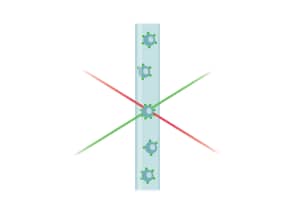
Induce dendritic cell maturation with TNF-alpha for 3 days.

Verify dendritic cell maturation by flow cytometry.
Mature dendritic cells are ready for downstream applications.

Citations for CellXVivo Human Monocyte-derived DC Differentiation Kit
R&D Systems personnel manually curate a database that contains references using R&D Systems products. The data collected includes not only links to publications in PubMed, but also provides information about sample types, species, and experimental conditions.
3
Citations: Showing 1 - 3
Filter your results:
Filter by:
-
A dietary commensal microbe enhances antitumor immunity by activating tumor macrophages to sequester iron
Authors: Sharma, G;Sharma, A;Kim, I;Cha, DG;Kim, S;Park, ES;Noh, JG;Lee, J;Ku, JH;Choi, YH;Kong, J;Lee, H;Ko, H;Lee, J;Notaro, A;Hong, SH;Rhee, JH;Kim, SG;De Castro, C;Molinaro, A;Shin, K;Kim, S;Kim, JK;Rudra, D;Im, SH;
Nature immunology 2024-04-25
-
Effects of Staphylococcus aureus Bacteriophage K on Expression of Cytokines and Activation Markers by Human Dendritic Cells In Vitro
Authors: HR Freyberger, Y He, AL Roth, MP Nikolich, AA Filippov
Viruses, 2018-11-08;10(11):. 2018-11-08
-
Linear doggybone DNA vaccine induces similar immunological responses to conventional plasmid DNA independently of immune recognition by TLR9 in a pre-clinical model.
Authors: Allen A, Wang C, Caproni L, Sugiyarto G, Harden E, Douglas L, Duriez P, Karbowniczek K, Extance J, Rothwell P, Orefo I, Tite J, Stevenson F, Ottensmeier C, Savelyeva N
Cancer Immunol Immunother, 2018-01-12;0(0):. 2018-01-12
FAQs
-
What method should be used for dissociation of cells in CellXVivo Human Monocyte-derived DC Differentiation Kit, Catalog # CDK004?
Cell scraping is prefered but dissociation in 2 mM EDTA can be used as an alternative method.
-
For CellXVivo Human Monocyte-derived DC Differentiation Kit, Catalog # CDK004, are the dendritic cells harvested on day 7 and day 10 adherent or in suspension?
When using Catalog # CDK004, the dendritic cells harvested on day 7 and day 10 are a mixture of cells in suspension and adherent cells. Typically ~50-90% of the cells are in suspension at day 7 and ~40-80% of the cells are suspension at day 10.
-
The Cloudz NK Cell Expansion protocol, Catalog # CDL004, recommends using T25 flasks. Do you have a protocol or recommended starting cell numbers for larger flasks, such as T75?
It is important to maintain a higher density of cells in the beginning of the culture, so start in a T25 and then scale up to a T75/T175 after 6-9 days when the cells are expanding exponentially. The cells expand dramatically at some point between day 6-9, dependent on donor.
-
Can dendritic cells be split after day 7 when following the protocol in Catalog # CDK004, CellXVivo Human Monocyte-derived DC Differentiation Kit?
Cells obtained on day 7 using Catalog # CDK004 kit are immature dendritic cells. If the desired application calls for immature dendritic cells, day 7 cells can be used. However, if mature dentritic cells are needed, the maturation protocol should be continued preferably in the same plate and cells should not be split at this stage.
Reviews for CellXVivo Human Monocyte-derived DC Differentiation Kit
Average Rating: 4 (Based on 4 Reviews)
Have you used CellXVivo Human Monocyte-derived DC Differentiation Kit?
Submit a review and receive an Amazon gift card.
$25/€18/£15/$25CAN/¥75 Yuan/¥2500 Yen for a review with an image
$10/€7/£6/$10 CAD/¥70 Yuan/¥1110 Yen for a review without an image
Filter by:


